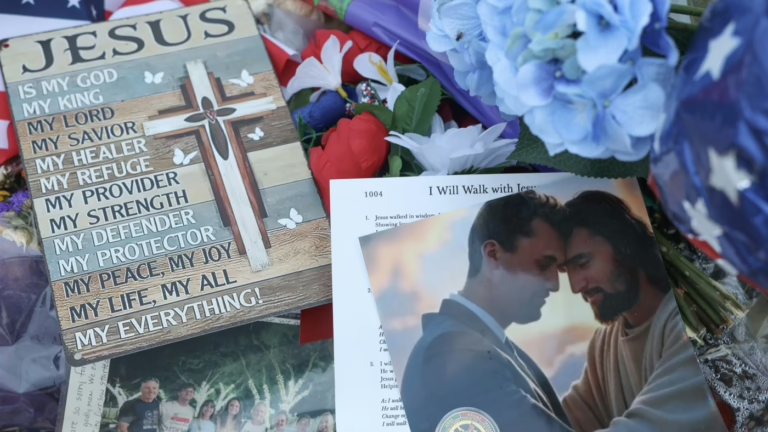Memorial tributes for Charlie Kirk are displayed outside Turning Point USA’s headquarters in Phoenix, Arizona, on September 18, 2025.
Joe Raedle/Getty Images
The memorial service for Charlie Kirk, held this past weekend in Arizona, prominently highlighted his evangelical Christian beliefs.
Taking place on a Sunday morning, the gathering resembled a traditional worship ceremony, featuring prayers, worship songs, and a heartfelt plea from Kirk’s widow urging attendees to forgive the person accused of his murder, invoking Christ’s example of forgiveness.
The ceremony began with modern Christian worship music, and speakers, including Kirk’s friends and colleagues, honored him as both a prophetic voice and a martyr for their cause.
Vice President Vance shared that in the two weeks following Kirk’s tragic death, he found himself speaking about faith more openly than ever before in his public career. He expressed gratitude to Kirk for supporting his political ambitions from the early days, back when Vance was an underdog candidate for a U.S. Senate seat in Ohio.
President Trump, who delivered the closing remarks, described the event as reminiscent of a “revival meeting.” He praised Kirk as “our foremost advocate for American liberty” and declared him “a martyr for the cause of freedom in America.”
Kirk’s Christian faith was a cornerstone of both his personal life and his political ideology. Raised in a Christian school environment, he, like many evangelicals, recounted making a conscious commitment to follow Jesus at a young age.
In a 2019 interview with David Brody from the Christian Broadcasting Network, Kirk reflected on how his faith deepened around the time he graduated high school and launched Turning Point USA.
“I began to develop a much closer relationship with Jesus Christ, immersing myself in Scripture and becoming unapologetically bold about my Christianity,” Kirk explained. “I faced a choice: either drift into secular culture or reaffirm my faith-and I chose the latter.”
After establishing Turning Point USA, an organization dedicated to empowering young conservatives to advocate for principles like free enterprise and limited government, Kirk later created TPUSA Faith. This branch explicitly focuses on combating “woke ideology” within American churches.

A mourner offers a prayer at the temporary memorial for Charlie Kirk outside Turning Point USA’s Phoenix headquarters on September 18, 2025.
Joe Raedle/Getty Images
Kirk frequently invoked his Christian beliefs when discussing political topics, particularly emphasizing that charitable aid should primarily come from churches rather than government programs.
His faith also underpinned many of his more contentious stances. He labeled diversity, equity, and inclusion (DEI) initiatives as “contrary to biblical teachings.” On abortion, he asserted that an embryo is “a child created in God’s image, deserving protection.” Regarding transgender issues, he controversially described it as “a defiant rejection of God’s design.”
Throughout his public career, Kirk’s perspective on the intersection of religion and politics evolved. Early on, he acknowledged that Christian conservatives sometimes overstepped by trying to enforce their religious values through legislation. In a 2018 conversation with conservative podcaster David Rubin, Kirk expressed reservations about imposing faith-based values via government.
“I don’t support pushing those beliefs through laws,” he said. “I strive to present my political views from a secular standpoint.”
At that time, Kirk affirmed his belief in the separation of church and state. However, in later years, he rejected this principle, calling it a “myth.”
By 2024, Kirk argued that the United States was founded not only by Christians but specifically by Protestant Christians, and he maintained that the nation’s success depended on maintaining this religious foundation.
“America’s political system was designed for a Christian, Protestant populace,” he stated. “One reason we face a constitutional crisis today is because we no longer have a Christian nation, even though our government’s structure remains Christian. Liberty cannot exist without a Christian citizenry.”
Following Kirk’s passing on September 10, prominent evangelical figures quickly hailed him as a martyr. Cissie Graham Lynch, granddaughter of the renowned evangelist Billy Graham, likened Kirk to “a contemporary Stephen,” referencing Christianity’s first martyr.
However, some experts caution against this martyrdom narrative. Matthew Boedy, an English professor at the University of North Georgia who researches Christian nationalism, warns that framing Kirk as a martyr could incite dangerous and potentially violent reactions.
“Historically, the concept of martyrdom has often been used to mobilize followers against perceived enemies, sometimes leading to crusades and conflict,” Boedy told NPR and WBUR’s Here & Now.

















